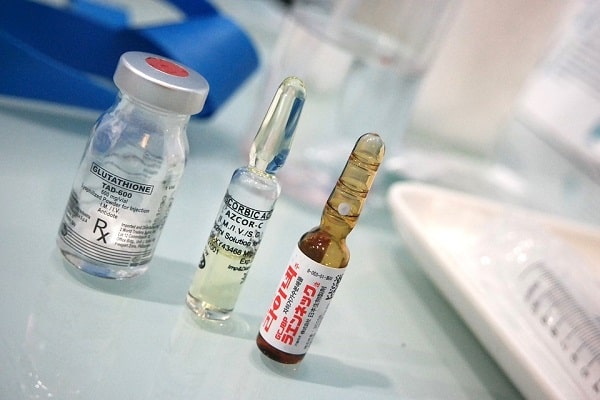On June 16th, 2020, a research group in the UK published results that could improve the outcomes of patients dealing with severe COVID-19 symptoms. Dexamethasone, a readily available drug, lowered death risk by about a third among patients using a ventilator. Here’s everything you need to know about the latest discovery in COVID-19 treatments.

Dexamethasone is a corticosteroid used to deal with symptoms for a variety of health conditions. Simply put, corticosteroids reduce immune system activity and in turn, this lowers inflammation.
Because of its effects on the immune system, patients are usually prescribed Dexamethasone to lower inflammation, regulate flare-ups in chronic anti-immune diseases and control allergic reactions.
While dexamethasone doesn’t treat the underlying cause of the excessive immune response, because of its anti-inflammatory effect doctors usually prescribe it to help patients cope with the symptoms.
The benefits of dexamethasone have made it a widely available drug. In fact, it’s been used since the sixties and was included in the WHO Model List of Essential Medicines since 1977 [1]. Patients can get it both branded and off-brand, and is relatively inexpensive compared to other prescription medications.
Despite its effectiveness, dexamethasone should always be used under medical prescription. Like other steroids, long-term dexamethasone use has different side effects including:
Because of these risks, dexamethasone -like other steroids- isn’t recommended when treating viral infections like influenza and SARS.
On June 22, 2020 Oxford University researchers published the preliminary results of a key clinical trial treating COVID-19 patients [2]. Earlier that month, they published the results through a press release, causing world-wide controversy.
The RECOVERY trial researchers discovered that low doses of dexamethasone increased survival among COVID-19 patients needing respiratory support.
These findings could be groundbreaking in our fight against the pandemic. The main issue with COVID-19 is that many infected patients eventually need to be connected to respiratory support, either with oxygen or through a ventilator. However, most health administrations lack the amount of beds and ventilators needed by the influx of COVID-19 patients. That’s why the epidemic is so deadly: as patient numbers rise, ventilator availability lowers and not all patients get the support they need.
Nevertheless, on the RECOVERY trial, dexamethasone reduced the death risk of patients and allowed patients to forgo respiratory support sooner than those not treated with the drug.
The trial involved administering low doses of dexamethasone (either orally or by intravenous injection) to patients. Patients with milder symptoms didn’t benefit from the drug and in some cases showed negative effects. Nevertheless, dexamethasone lowered the death risk of patients connected to a ventilator by a third, and those needing oxygen by a fifth.
These results are in line with dexamethasone’s immunosuppressive effects. COVID-19 acts on the body’s respiratory system, and the natural response of our immune system is to attack the virus. In turn, this causes inflammation. However, as the virus spreads, the inflammation stops fighting the virus and instead weakens the respiratory system. At this point, the patient would be connected to a ventilator. In those cases, dexamethasone could help patients by lowering inflammation in the lungs and counteracting their body’s immune response.
After the result’s release, many researchers were hopeful by the results, while also raising some important points.
For example, the RECOVERY trial covered 2,104 patients on dexamethasone, and compared them against 4,321 people who didn’t take the drug. Although the results are interesting, those patients represent only about 5% of COVID diagnosis.
In fact, according to Rajesh Gandhi, a doctor at the Massachusetts General Hospital and Harvard Medical School in Bostin, for many patients, dexamethasone wouldn’t be a good choice [3].
Even though it shows great anti-inflammatory properties, dexamethasone can be dangerous for COVID-19 patients because of the way it works. As we already mentioned, this drug has a strong immunosuppressive effect. Because of it, dexamethasone has been shown to worsen other viral infections like influenza and SARS. For that reason, it still isn’t the first choice for patients with viral. diseases.
Another contention point is its effectiveness among patients with mild symptoms. Dexamethasone could reduce the death rate of about a third of patients with acute respiratory insufficiency, and about a fifth for patients needing oxygen. Nevertheless, dexamethasone not only was ineffective on patients without acute symptoms but also its immunosuppressive activity could endanger the lives of these patients, worsening their body’s response to the virus.
On the other hand, the trial results haven’t been peer-reviewed. In the medical community, researchers publish their findings and then other groups replicate the results using the same methodology. In the case of the RECOVERY trial, neither the methodology nor the full results have been made available.
For that reason and despite the promising outcomes, the medical community doesn’t recommend dexamethasone as the mainstream medication for all patients. To make this the regular medication for COVID, we’ll need to wait for further testing.
0 comments